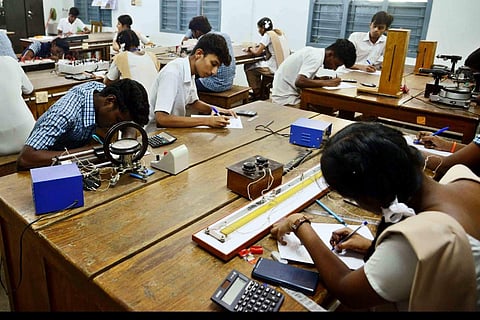

Almost 80 per cent of parents, mostly in urban and semi-urban settings, would rather have their children drop a year than send them back to school, found a study by SP Robotic Work. But 64 per cent of the parents also feel that online learning meted out by the schools are nowhere near satisfactory — 67 per cent of the students agree with them.
For at least the younger children to have a proper online class, the parents need to be there to ensure the infrastructural facilities at home are adequate and working properly. "The parents have to be around to see if the internet is working, there are no power cuts and the line does not get disrupted. Secondly, the children lose focus as they are just looking at the screen. They do not have a real classroom and most of them, their parents said, minimise the tab and go on to play games. The effectiveness of the lessons are also questionable here as the teachers cannot properly monitor the students," said Sneha Priya S, Co-Founder and CEO of SP Robotic Works.
"Parents from Bangalore, Mumbai, Hyderabad and mini-metros are sceptical about sending their children to school, even if it is declared safe, with about 86 per cent of them unwilling to take any risk with the children. However, Chennai and Kolkata are the only exceptions among the major cities where the ratio of parents that are willing to take chances with sending their children to school is higher than the national average. Among the cohort, the salaried guardians are the most protective, with only 17 per cent willing to send their children to school as soon as the schools reopen as against 30 per cent of self-employed and 56 per cent of freelance workers," said the report.
The study also reveals that 49 per cent of the children, across ages, watch videos on YouTube as their recreation and Sneha added that all of it is not for entertainment alone. "Maybe 40 per cent of the content they consume is just cartoons and gameplay videos but children today are also consume edutainment videos which are definitely fun to watch but are informative as well," she added. "Children, nowadays, grow up with tech and they are not just accustomed to it but are also interested in the tech. With a little grooming and help they can even develop their own apps," said Sneha.
Keeping in line with the trend of child coders and innovators, robotics is one of the most popular hobbies for the children between the ages of 13 to 17 years, found the study. "Coding and robotics have become more interactive than ever and thus keeps the children interested," she said.
What do you want to be when you grow up? All of us have been asked this question and nothing but aspirational dreams blossomed in our minds — pilot, scientist, doctor, astronaut, nothing was beyond our imagination. But today's kids are probably more practical and organised in their dreams too. "Amongst the choices for dream jobs, 15 per cent of girls aspire to become entrepreneurs when they grow up, a higher percentage than boys. Entrepreneurship is second only to the fancy of becoming a doctor. According to a 2015 study by McKinsey Global Institute, India's GDP could rise by between 16-60 per cent by 2025 if women participated equally with men in the economy," said the study. "Projections show that this could mean a whopping $2.9 trillion added to the economy. If we can nurture this dream of school-going girls well India surely has a chance of becoming a $5 trillion economy by 2025," it further added.
Following the great Indian dream, 52.5 per cent of the children wanting to either be a scientist, technologist, data scientist, or doctors. But the desire to become a scientist declines as the child ages, owing to the strict and theoretical approach to STEM in the current education system, said the survey.
